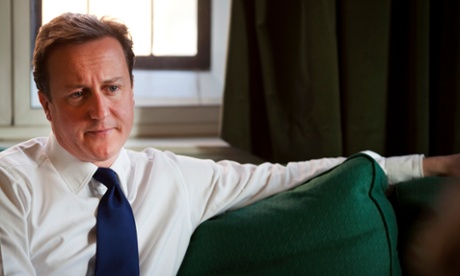
David Cameron is to be interviewed live on Monday evening, streamed across the internet (via Facebook) by the UK outpost of BuzzFeed, an outlet that only launched on these shores two years ago and didn’t exist anywhere until 2006.
The interview will be conducted by 25-year-old Jim Waterson, BuzzFeed UK deputy news editor, in an informal “Brews” format usually used for more glitzy stars such as Sir Patrick Stewart and Daniel Radcliffe.
The Cameron interview is a huge coup for BuzzFeed UK, which has followed its US parent in rapidly shaking off a reputation for focusing on cat-obsessed LOLs and “listicles” by hiring serious, award-winning journalists and breaking significant stories.
It comes just five weeks after BuzzFeed in the US secured an interview with an even bigger name – Barack Obama.
Obama not only gave a lengthy interview to BuzzFeed News editor Ben Smith, he also took part in a humorous video skit that gave the president the chance to push his message about signing up for government-backed healthcare.
BuzzFeed isn’t the only new media upstart successfully courting the political elite.
In early February Vox, the explainer journalism site set up by former New York Times wunderkind Ezra Klein, also bagged an interview with Obama, which ran as a series of videos and a lengthy Q&A.
And only last Tuesday, Vice chief Shane Smith spent the day with the US president as he visited Atlanta, taking in a visit to Georgia Tech university and culminating in an in-depth interview.
What is driving this increasingly cosy relationship between youth-oriented online media and the political elite?
Obama has made a habit of embracing new technologies, using social media to drive election campaigns and even taking part in one of Reddit’s famous “Ask me anything” sessions. Meanwhile, Cameron will be hoping some of the outlet’s cool will rub off, and treading in Obama’s footsteps is a popular course for British politicians.
But more importantly for both leaders, sites such as BuzzFeed and Vice offer politicians the same thing they offer advertisers: the ability to reach a broad swathe of young people who are increasingly disengaged from the newspapers and broadcast TV channels that have dominated political coverage.
Young people may vote in significantly smaller numbers than their older peers but, lacking the same tribal loyalties as older generations, they are also more up for grabs for politicians who can appeal to them.
A more complex question is why are these new media outlets – who have built large audiences of young people by eschewing traditional subjects and styles of coverage – now trying so hard to muscle in on the mainstream?
The obvious answer is web traffic, but that’s only part of the story. Putting up a photo of a dress and asking what colour it is gets you traffic, certainly more traffic than a even a spiced-up political interview. But sitting down with a president or PM gets you credibility, not just with audiences, but with advertisers.
Many in the ad industry are still only just coming around to the idea that these are (at least sometimes) serious media organisations with loyal audiences and talented journalists.
While the ad technology industry embodies the forward thinking of Silicon Valley with targeted ads, data-driven decisions and geolocation, many of the people who control ad spending, the media planners and agencies, remain surprisingly conservative.
They plump for print or TV ads bought from people they’ve been having lunch with for years, rather than trying out the new kids on the block offering the big audiences of an age more mature peers struggle to reach.
By pulling in a president or prime minster, BuzzFeed and its digital signal to the ad industry that they should be considered alongside the digital properties of the Times, Telegraph or Washington Post when it comes to spending the big budgets from the world’s biggest brands.
Getting the most powerful person in the country to give up their time immediately puts you in the same class as the established news outlets. This increasingly successful striving for equal consideration should should worry established media.
It’s proving far easier for BuzzFeed, Vox and Vice to build respectability among the mainstream than it is for more traditional outlets to lure in younger audiences that aren’t paying them any attention.
If advertisers view the BuzzFeeds of this world as just as respectable as newspapers and broadcasters, then one of the few advantages established media still have commercially – special status in the eyes of the ad industry – will evaporate.







